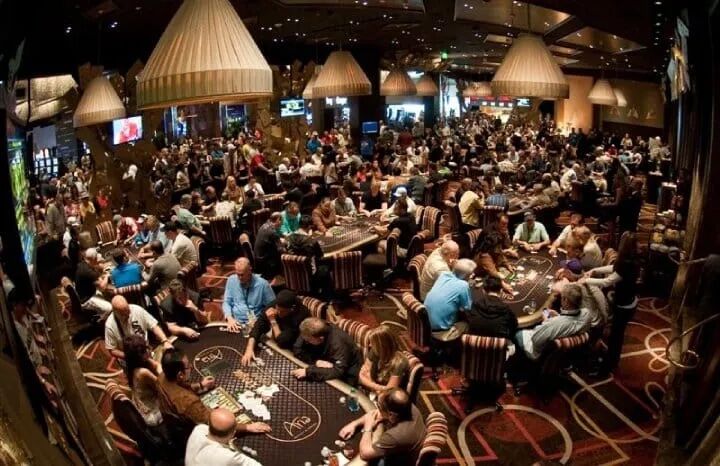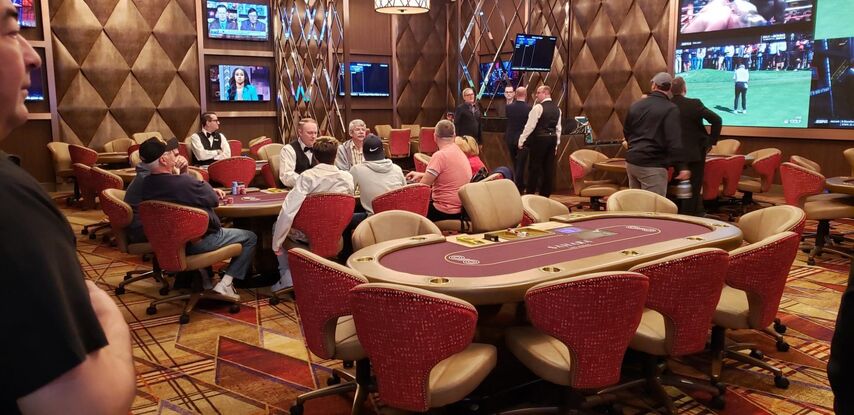I make $100k a year, but I want to quit my job and become a professional player. Am I out of my mind?
A topic with this title was recently opened by a user on reddit.
"The last couple of weeks I've been thinking about leaving my job as we got a returning boss that is a pain to deal with. I've been at my job for 6+ years and the pay is good, the work is monotonous, and the team I worked with was good so I just stuck with it. I always had the idea that I was going to take a chance and play poker professionally for one year in Vegas after I graduated college 6+ years ago to see if this was something I could do before entering the job market but I got an internship at my current office and married all around the same time. I chose the safe route.
I'm still happily married and living somewhat comfortably in a HCOL area (Cali). The plan is to leave my job and this HCOL and move to Vegas to play full-time as a poker pro. My wife supports my decision as she has seen I've been successful at everything I put my mind to. We have 0 debt and about $200k in assets which $50k would be my bankroll, another $50k would be to cover the cost of living for 2 for 12 months and the other $100k would be emergency funds that I would have to borrow against my retirement. My wife has a degree as well but is unemployed and changing careers so she can work part of full-time as well until she gets into her accelerated nursing program.
I'd be playing $2/$5 as my current stakes are a mix of $2/$3 and $5/$5. I am not expecting to make $100k/yr at those stakes as it isn't realistic and I'm hoping somewhere in the neighborhood of $60k/yr. Moving to Vegas would cut our expenses about $12k/yr since the rent and everything is significantly cheaper than California.
I just don't have any recent and significant sample size as I was busy and stopped playing poker since I was making enough from work. I know that I am not some insane crusher and that my hourly rate could be $30/hr to negative hourly but overall I've been a proven winner. I was crushing online pre-black friday at 25nl but anyone with a pulse could've. I joined the military and transitioned to live play the first two years and made about $20k-$30k over two years to pay off ~$15k in CC debt and had enough to start stock investing.
During college, I started a blog on 2+2 forums (Blog (https://forumserver.twoplustwo.com/174/poker-blogs-goals/boxerzs-grind-2-5-a-1356486/?highlight=) link) and then transitioned to online and did some traveling. We ended up moving into a poker house filled with wannabe online MTT grinders but I was working full time and played online casually. I was only one of the few winners as I watched a majority of the guys lose at micro stakes. I always did well as I for the most part looked at it as a job and not a form of entertainment. I lost the drive to play as I made more and more money at my job but I feel like I've been stuck staring at a wall at my current job.
I want to go pro not for the money but for the freedom and somewhat for the challenge. I do enjoy analyzing hands and studying to perfect whatever I'm interested in. I just returned from two 1 week long vacations to Vegas 3 weeks apart. I enjoyed the freedom of getting up in the morning fully rested since I don't have to report in a certain time. I enjoy the freedom of being able to step away on a bad day, clear my mind at the gym, analyze hands then go back at it.
It will be a different beast as my capital dictates part of my income as in what stakes I am bankrolled and skilled enough to play in. The stresses of losing sessions and being able to food on the table (should be covered by the money saved up). I need an outside opinion. Am I crazy?"

The post sparked a lively discussion on Reddit and garnered over 400 comments.
“This is too ambitious a plan for a man who has hardly played lately,” writes the author of the most popular comment. However, if you take such a step, then you have ideal starting conditions. You decide what to do with your life. But, if you lose $20-25k at the micros in Vegas, it will be something to think about.
I advise you to invest some money in education. Start playing with a $45k bankroll and spend $5k on a trainer and software. Most players do not invest money in their development, but for the pros, it is a must. Even if you're currently in the red, after six months of hard work, you'll be a $2/$5 winner in Vegas with no problem.
– I agree with everything. I give myself 6-12 months to understand whether I am capable of this in principle. If all else fails, I will calmly accept this fact and return to office slavery. Once I used software – HEM, Table Ninja, and so on, but now all this is irrelevant. In my youth, I even applied for a paid analysis of the database, but it seemed to me a waste of money. I am open to suggestions on how to work on the game in the most efficient way. Already signed up for an annual GTO Wizard subscription. I quit online at the same time that the GTO game was starting to gain popularity, so now I just started to study new concepts, as I understand that modern poker has nothing to do with my old school exploitative approach.
– This is far from the worst option – if in 12 months you do not succeed, and you just return to the office. Not everyone can afford this. It will be much worse if you immediately have good results due to an upstreak, and after two years it turns out that you are still a minus one. With such a break and a hole in the resume, it will be more difficult to return to work. When you make a decision, forget about medicine, retirement, and other issues that poker players don't think about at all.
The problem is that poker doesn't fit well with a balanced family life when you have a wife and children. Even when you get to the $100-150k expectation, you will only match what you would get at your job. But in doing so, you're sacrificing career growth, and a pay raise and a promotion at a young age is the key to success and a $200k+ salary at 35. I'm 33, a former pro player, but traded poker for a successful career, wife, and two young children.
– Far from all areas have a linear relationship – the more experience you have, the higher the salary. In my profession (IT), experience can work against you, as there is age discrimination. It is believed that with age, employees become slower, and they need to be paid more salaries compared to young people.
A friend of mine gave up a successful business career for photography. And this is one of the most competitive professions, but at 30 he decided that this is exactly what he wants to do. Now he has his own studio and a lot of clients. Another friend left a stable job for poker, and through new acquaintances became a venture capitalist.
I'm not writing all this in order to push the author of the topic to poker. I just want to point out that the safest is not always the best. You should not always choose the most reliable option, especially since it often turns out to be just an illusion of stability.
– Poker freedom can be a big disappointment. You will become a slave to the game, you will not be able to think about anything else, and you will stop appreciating the simple joys of life. Have you ever had a big downswing where you can't win a single hand for months after months? My inner pessimist advises not to forget about the disadvantages of professional poker. Try to combine poker with work first. Set aside a certain number of hours per week for this to get a taste of the grind and gain at least some distance.
– I also went the way that the author did. The only difference is that when I quit my job, I already had over 1,000 hours of winning live play. My expectations were 100% met, I got the freedom I was looking for. I just want to note that it is one thing to grind when the result of one session determines whether you can pay the bills and quite another when you are financially stable and can afford to lose. I had a lot of downswings, but psychologically I endured them quite calmly.
– There is hardly anything more boring than live micro-stakes grinding.
– I agree, at first everything will be interesting due to the novelty, you will meet absolutely incredible characters at the table. But if you don't grow steadily in limits, in a couple of years you will hate the grind and everything connected with it.

“I make six figures in the office and manage to play poker about 600 hours a year. On average, this brings me another $40-50k. If I focused fully on poker, I think I could make $120-150k a year, although probably even less, because I would often play in suboptimal conditions. Throw in pensions and health insurance and the outlook for poker isn't so bright.
– And are you married? – the author specified. – I work 40 hours a week, if I add 600 hours of poker to this, it is unlikely that I will be able to save the family.
– Yes, I have no family and other obligations, except for the gym. Work takes about 20 hours a week, there is a lot of free time. There was a three-year period that I completely devoted to poker, but in the end, I realized that this was not suitable for me. The lifestyle is terrible. You are greatly mistaken if you think that you can play from 9 to 5 and lead a full life. Most often, professional poker is work in the 2nd and 3rd shifts.
– I have a rather dull job, so I often think about something like that. Let me share my findings:
Get ready right away that poker won't make you a millionaire. Playing for profit and steadily growing in limits is not given to everyone. Most have been grinding low and medium stakes for years without much prospect.
Poker is the perfect hobby. You play for fun and if you are lucky, you win something in addition to your main income. Streaks do not affect you in any way, because paying bills is completely independent of the result of the session.
Poker is a disgusting job. There is nothing worse than long downswings. It's not the most positive feeling when you get run over by two outs on the river in a pot that's worth a month's rent.
All the players I know, even the most successful ones, hate poker and want to quit as soon as possible. This is a grueling grind, constant communication with scammers and other vile characters, a lot of politics, and underground games. Real prospects open up only on high stakes and closed games.
There are many factors that you have no control over. For example, in live poker, there is practically no game selection at stakes above $2/$5. The game is small, the field is limited, and you have to make the amateurs enjoy losing their money to you.
Thank you for your comment, the author said. – I do not consider poker as a profession for life. But I want to see what I can achieve. I remember that before "Black Friday" I successfully fought with regs on PokerStars. Among them was, for example, WCG|Rider. Then I quit online and joined the army, and Doug Polk became a world celebrity. Sometimes I ask myself what I could have achieved if I hadn't quit poker and kept working on the game. I understand perfectly well that it is unlikely that I will be able to earn exorbitant amounts, there are real chances that I will generally break even or lose money.
If you can succeed in poker, then you will succeed in almost any area and earn a lot more at the same time. Stay at work, save money, retire early, and then play whatever your heart desires.
– I see poker as the next step in my life. My ultimate goal is to own my own business so that I don't have to work for anyone. I've worked for my uncle all my life, I'm very good at it, but I still have the feeling that I'm capable of more. I have been successful in the military, in college, and at work. And now I need a new challenge. The army was a stepping stone to college, I graduated from it to appease my parents. I was offered a $90k bonus to stay in the service, but I turned it down and everyone I knew thought I was crazy. But I chose to do an internship in the office, which eventually led to the current salary.















